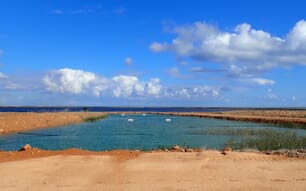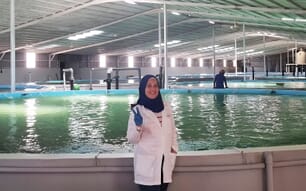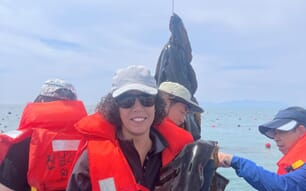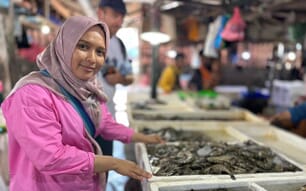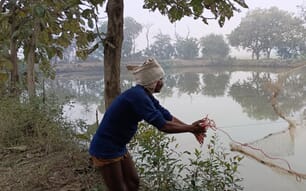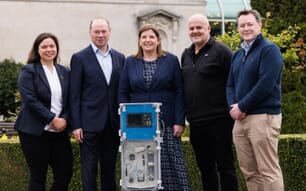Briefly describe your aquaculture career
I studied fisheries at the University of Benin, Nigeria. I’m now a consultant, and master trainer in aquaculture at the Nigerian Agricultural Enterprise Curriculum (NAEC). As a student I was passionate about aquaculture – all I kept discussing was fish farming, which eventually paid off after I graduated. Establishing a relationship with USAID MARKETS II [a US government-funded programme to support small farmers in Nigeria] and Partnership Initiatives in the Niger Delta (PIND) foundation provided a wider sphere of influence for me. Training farmers across the Niger Delta states has been a fulfilling experience.
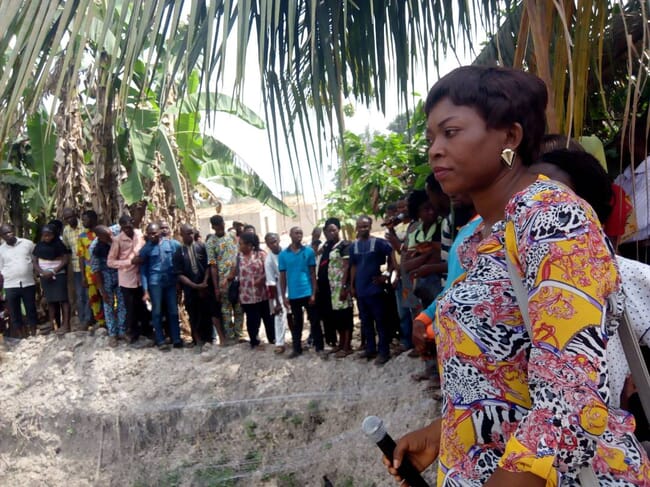
What inspired you to start your own fish farm?
As an aquaculturist and fish processor searching for where to start my fish farm, I came across an Ondo State government-owned former fish farm that had been abandoned for 20 years and was available for lease. No one wanted it because of decay the resources required to make it functional, but I took the lease and revived it. Today, others have joined and it’s now called Adegbemile Fish Cluster. The farmers produce mainly catfish there, but also some tilapia, and it generates both direct and indirect employment in the region.
How easy was it to revitalise the old site?
The place had grown wild, with big trees and all sorts of reptiles. It was like going into a forest to start up a fish farm. The remains of the ponds were extremely large but barely a foot deep. I made the ponds smaller and deeper, digging down to 1.2m, and have made lots of repairs over time.
How many tonnes of catfish do you produce a year and what are the major production challenges?
I started with one pond and the capacity to produce six tonnes annually, but today I have expanded to 90 tonnes per annum. Initially I was able to fund the project with personal savings and loans from families, but having to expand to 90 tonnes per annum has not really been easy.
The major challenge is financing fish feeds, which account for 70 percent of my production cost. This is compounded by the lack of access to funds and agricultural loans.
Describe a typical day in your current role
The first thing I do whenever I get to the farm is to walk around the ponds to be sure everything is in proper shape. Then I request samples of pond water to test the pH and other water-quality parameters and update the records.
I walk along the pond dykes to observe how the fish respond to feed and how well the feed is utilised for growth. With this assessment, I will be able to tell whether everything is fine. Observation is the basic thing outside feeding, except on days that certain activities like grading or harvesting will be carried out.
How did you persuade or inspire other women to join you as fish farmers?
My success in the sector has been my greatest tool for inspiring women. As a trainer, I give enterprise training using the NAEC model and aquacultural best practices using demonstration pond techniques. After training they are well equipped for the business and I also stay on to coach them.
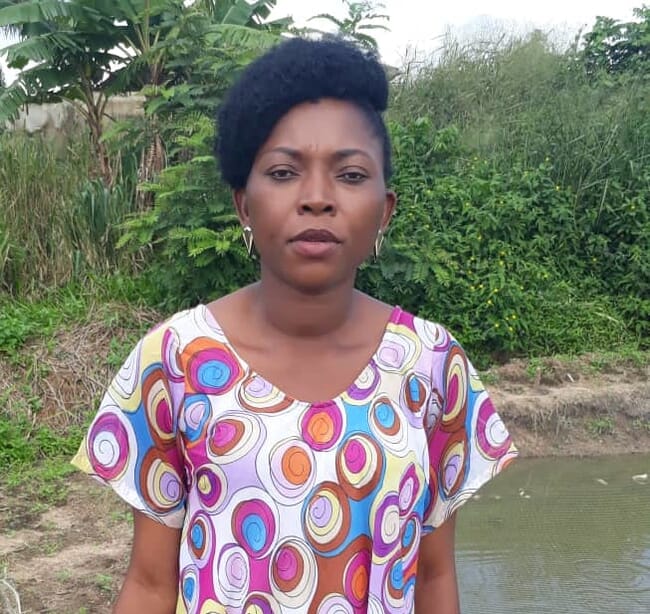
What does your role with WOFFAN involve?
As an executive in Women in Fish Farming Association of Nigeria (WOFFAN) – which aims to promote sustainable fish farming for women – I take it upon myself to train women and young people in aquaculture because too many go into fish farming without the necessary technical knowledge.
How did you manage to expand the business?
Initially, when I started, I reached out to the Bank of Industry (BOI), but could not access any loans due to my lack of collateral. I have not accessed any loans for my fish business to date but believe that someday it will be achieved.
While in school, I was more of a practical than a theoretical person. I would always volunteer to take care of the departmental fish ponds during holidays. Seeing the way graduates were scrambling for jobs, I decided I was going to have my own fish farm and processing units for different agricultural commodities. In my third year in school, I started a small homestead fish pond which I continued for some years after graduation.
In 2005, I moved to a new city, Akure, because of marriage, but wasn’t able to farm there due to my lack of access to ponds. In 2006, I joined a firm that was about setting up a fish farm and I managed the farm for about four years and trained all my staff and other young people who came as trainees from different tertiary institutions. But I was still not able to realise my dream of becoming an entrepreneur and had to search out a suitable plot of my own to farm independently.
What’s the most unusual experience you’ve had in aquaculture?
The day my staff called me to say that there was a massive outbreak of mortalities in one of my ponds. We had to transfer all surviving fish into holding tanks and only a third of the total stock was rescued. It was an unpleasant experience.
Are there any individuals or organisations you’ve found particularly inspirational?
Many years ago, after graduation, I travelled down to the University of Benin to see my project supervisor, Dr BS Aliu, who wanted to encourage me to go for my Masters and PhD. He said my project work on a paper, “The growth responses of African catfish Heterobranchus x Clarias hybrid fingerlings fed dietary plant and animal lipids” – which was published in the Nigerian Journal of Fisheries in September 2006 – was very good, but that I needed to do more work. That really inspired me.
Equally the PIND foundation has inspired me greatly through training, and – as I’m an aquaculture service provider (ASP) with them – a grant was given to me to train a hundred farmers. Having worked with USAID and PIND, I met wonderful people who were very inspirational to me. They gave me the platform to express myself and do what I know best. I am forever grateful that our paths crossed.
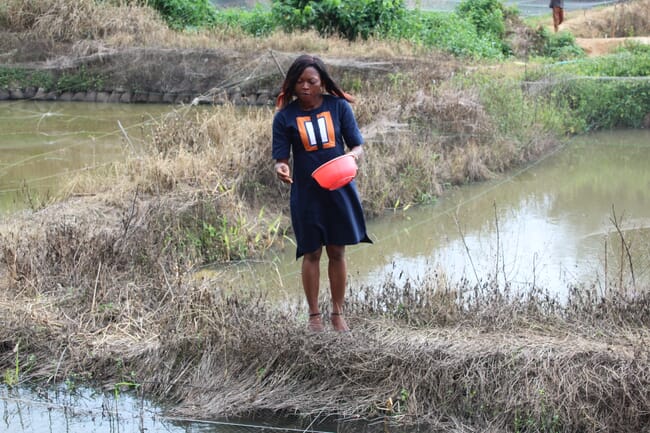
What advice would you give to women looking to start a career in the sector?
My advice is to train at every opportunity. Many believe that finance is the major challenge but once you are equipped with the technical knowledge of aquaculture production and processing, you’re set up to excel in the business.
I am an advocate for women in aquaculture. For many years l was the only female aquaculture service provider working for the PIND Foundation but now we have several female advocates for women in aquaculture.
What would be your dream role in aquaculture and do you think it’s realistic to achieve?
My dream role is to become recognised both nationally and globally in order to enable me to process smoked and frozen fish from across Nigeria for export to different countries.
What outstanding challenge in aquaculture would you most like to solve?
Farmers need better access to finance for high-quality fish feeds and to increase their processing capabilities. As a distributor for a number of different fish-feed companies, I have seen how farmers suffer when they can’t buy adequate feed. Many fish are underfed because of lack of funds and in the end profits are not maximised, thereby discouraging many fish farmers.
The conversion ratio of people who have been recently trained to practise aquaculture is relatively low. In many instances, I’ve had to give credit to my trained fish farmers for feed and wait for them to pay me back after harvest.
How do you think the fish farming sector in West Africa is best placed to fulfil its potential?
I believe that aquaculture has great potential in West Africa, but we need to adhere to best practices and allow access to funds that can push the industry beyond its current level. The need for training and retraining should also be emphasised so that those who have the necessary funds will not lose out on the grounds of ignorance and illiteracy.

